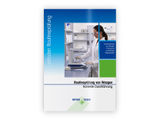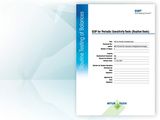|
UniProt es el (universal protein resource) o Proteína Universal, un depósito central de la proteína de datos creada mediante la combinación de Swiss-Prot, TrEMBL y PIR. Esto lo hace el recurso líder mundial más comprensivo sobre la información de proteína. Conocimientos adicionales recomendados
El Consorcio UniProtThe UniProt Consortium comprises the European Bioinformatics Institute (EBI), the Swiss Institute of Bioinformatics (SIB), and the Protein Information Resource (PIR). EBI, located at the Wellcome Trust Genome Campus in Hinxton, UK, hosts a large resource of bioinformatics databases and services. SIB, located in Geneva, Switzerland, maintains the ExPASy (Expert Protein Analysis System) servers that are a central resource for proteomics tools and databases. PIR, hosted by the National Biomedical Research Foundation (NBRF) at the Georgetown University Medical Center in Washington, DC, USA, is heir to the oldest protein sequence database, Margaret Dayhoff's Atlas of Protein Sequence and Structure. In 2002, EBI, SIB, and PIR joined forces as the UniProt Consortium. The Roots of UniProt DatabasesEach consortium member is heavily involved in protein database maintenance and annotation. Until recently, EBI and SIB together produced Swiss-Prot and TrEMBL, while PIR produced the Protein Sequence Database (PIR-PSD). These databases coexisted with differing protein sequence coverage and annotation priorities. Swiss-Prot is recognized as the gold standard of protein annotation, with extensive cross-references, literature citations, and computational analyses provided by expert curators. Recognizing that sequence data were being generated at a pace exceeding Swiss-Prot's ability to keep up, TrEMBL (Translated EMBL Nucleotide Sequence Data Library) was created to provide automated annotations for those proteins not in Swiss-Prot. Meanwhile, PIR maintained the PIR-PSD and related databases, including iProClass, a database of protein sequences and curated families. The consortium members — all dedicated to the same goal of providing expansive and meaningful protein annotation, and all with solid foundations stemming from decades of activity — decided to pool their overlapping (and, importantly, their complementary) resources, efforts, and expertise. The UniProt databases build upon these solid foundations. Organización de UniProt DatabasesUniProt ofrece cuatro datos básicos:
La financiación de UniProtUniProt es apoyado principalmente por el Instituto Nacional de Salud (NIH) grant 2 U01 HG02712-05. Additional support for the EBI's involvement in UniProt comes from the European Commission (EC)'s FELICS grant (021902RII3) and from the NIH GO grant 2P41HG02273-07. Swiss-Prot activities at the SIB are supported by the Swiss Federal Government through the Federal Office of Education and Science, by the European Commission FELICS grant (021902RII3) and by the PATRIC BRC (NIH/NIAID contract HHSN 266200400035C). PIR activities are also supported by the NIH grants and contracts HHSN266200400061C, NCI-caBIG, and 1R01GM080646-01, and the National Science Foundation (NSF) grant IIS-0430743. Referencias externas
Plantilla:Biology-footer Categoría: Bioinformática |
|
| Este articulo se basa en el articulo UniProt publicado en la enciclopedia libre de Wikipedia. El contenido está disponible bajo los términos de la Licencia de GNU Free Documentation License. Véase también en Wikipedia para obtener una lista de autores. |

Último visto

Enciclopedia




